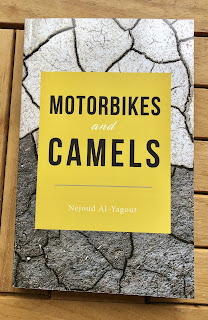My book selection for Kuwait was Motorbikes and Camels, by Nejoud Al-Yagout. This is the author’s debut novel, and I thought the format was particularly interesting. The book consists of stories about thirteen different people, all of whose lives are intertwined with the lives of one or more other people in the book. While the plot doesn’t feel like a continuous story with a beginning, middle, and end, the reappearance of the same characters in the different stories gives the book some cohesion.
The first story is about Salma, who is struggling to understand why her interactions with men never work out the way she wants them to. Two men in her life have their own stories, as do other women they’re involved with. We learn about the manipulative Aisha, whose life touches on those of several other characters in the book. The man Aisha marries, Hussam, is gay and has been trying to repress the fact ever since his father discovered him with a man. There is a chapter about Salma’s uncle, Mohammed, a bigamist whose favorite thing about his religion seems to be the liberties he is permitted as a man. His story is followed by those of his two wives, who have started to resent his sexism. Another chapter revolves around Mike, a foreigner who has converted to Islam and who seems to have a thing for Kuwaiti women.
The stories all feature discussions about love or sex, as well as various interpretations of Islamic law and beliefs. There was a lot more alcohol-drinking and sex outside of marriage than I would have expected, and quite a bit of back-and-forth about whether women should or should not wear a veil, which is apparently not required by law in Kuwait.
While each of the stories were entertaining, I found the epilogue to be confusing and not of a piece with the rest of the book. It involves Salma going to a spiritual retreat in India, where a guru answers people’s questions about love and sex. I don’t know what the author’s purpose was in adding such a disconnected piece to the end of her book. All in all, however, I thought Motorbikes and Camels provided an interesting glimpse into Kuwaiti culture.
COOK
The only mentions of food in Motorbikes
and Camels were about dishes that aren’t Kuwaiti cuisine – avocado toast
and coconut and pumpkin curry, for example. Salma becomes vegan during the
course of her story, but no vegan Kuwaiti dishes make an appearance. In
looking online for recipes, most of the ones I found were very meat-centric. So
I was happy when I found a recipe for Kuwaiti lentil soup
on the “Recipes Wiki” website. It was different than other lentil soups I’ve
made because the lentils were puréed after they were cooked, and then
potatoes and dried lemons were added to the soup. The potatoes made it a more
hearty dish, and the dried lemons gave it a little tang. The only change I
had to make to the recipe was to replace the ghee with Earth Balance spread.

GIVE
Since Kuwait is a wealthy country, I wasn’t surprised that GlobalGiving didn’t have any projects listed in that country. I found a few nonprofit organizations when I searched online, but the websites were in Arabic and there didn’t seem to be an easy way to make a donation. Finally, I found a link to a GoFundMe campaign to help raise money for Touch of Hope, an animal rescue effort in Kuwait dedicated to helping injured, abused, and abandoned animals. The women who run this shelter were recently evicted from their farm, so money raised by the GoFundMe campaign will help them to relocate. More information about Touch of Hope is available here.




